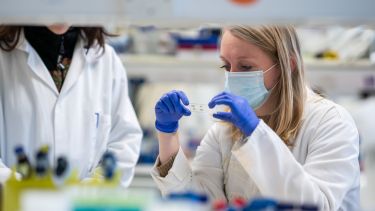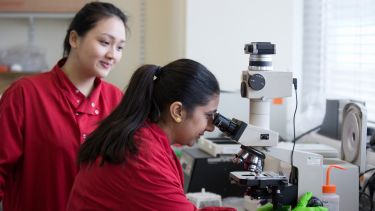Explore this course:
Applications for 2024 entry are now open. Apply now or register your interest to hear about postgraduate study and events at the University of Sheffield.
Molecular Medicine
School of Medicine and Population Health,
Faculty of Health

Course description
Lead academic: Dr Martin Nicklin
This course brings together the biggest recent advances in biology so you can understand human disease in detail, at the most fundamental level. It covers the cellular, molecular and genetic factors behind a wide range of illnesses, and how new technologies are revolutionising scientific discovery, diagnosis and treatment.
You will study diseases that are caused by a single gene defect, and the more complex molecular mechanisms that lead to cancer, as well as chronic diseases with overlapping causes that primarily affect ageing populations. You will also learn about the role of the immune system and, in the laboratory, you will examine models of the immune system in healthy and diseased states.
There is training on RNA and DNA sequencing, mass spectrometry techniques, and how these are used to process huge volumes of bioinformatic data to better understand disease. In computational laboratories, you will learn how to map genetic sequences, design PCR reactions that allow you to study your data in more detail, and identify genetic variations in a patient, for example. There is also an optional introduction to the programming language R, which can be used to analyse and present complex data sets.
The course also explains how studying disease at a molecular level can lead to new treatment options for patients. You can learn about a variety of biologic therapies developed in the biotechnology and pharmaceutical industries, and how potential new drugs are identified, designed and tested.
You will also complete a research skills training programme and, after all other teaching has been completed, you will spend 20 weeks working full-time on your own research project. Working as part of a team of professional scientists, you will have the opportunity to test a hypothesis, design experiments, analyse your results and present your findings.
Example research projects
Research projects are usually lab-based and a range of topics are available each year. Projects completed by previous students include:
- Stability control – how mRNA stability regulates inflammation resolution
- Targeting P2X7R to overcome hypoxia-mediated progression of breast cancer
- Identifying new targets for pancreatic cancer treatment
- Beta-1-integrin control of mammary tissue morphogenesis and cancer
- Precision therapy in NBAS-related disorder
- Exploiting the DNA Damage Response (DDR) in osteosarcoma
- Modulating neutrophil cell death mechanisms to treat chronic inflammatory disorders
- Improving efficacy of immunotherapy in cancer-induced bone metastasis through targeting TGFB
- Targeting breast cancers with the novel checkpoint inhibitor Tim3 and an oncolytic virus
- Utilising qPCR for the simultaneous detection of common skin infections present among children in the Gambia
Do you have a question? Talk to us
Book a 15-minute online meeting with our course tutor to find out more information and ask further questions.
Modules
A selection of modules are available each year - some examples are below. There may be changes before you start your course. From May of the year of entry, formal programme regulations will be available in our Programme Regulations Finder
Core modules
- Research Skills
- Molecular and Cellular Pathogenesis of Human Diseases
- Immunology of Human Diseases
- Mining Bioinformatic Data
- Mechanisms in Chronic and Age-related Diseases
- Biologic Therapy
- Small Drugs for Chronic Disorders
- Molecular Basis of Cancer and Cancer Diagnosis
- Research Project
The content of our courses is reviewed annually to make sure it's up-to-date and relevant. Individual modules are occasionally updated or withdrawn. This is in response to discoveries through our world-leading research; funding changes; professional accreditation requirements; student or employer feedback; outcomes of reviews; and variations in staff or student numbers. In the event of any change we'll consult and inform students in good time and take reasonable steps to minimise disruption.
Open days
An open day gives you the best opportunity to hear first-hand from our current students and staff about our courses.
Find out what makes us special at our next online open day on Wednesday 17 April 2024.
You may also be able to pre-book a department visit as part of a campus tour.Open days and campus tours
Duration
1 year full-time. We are unable to offer a part-time or distance learning study option for this course at present.
Teaching
You will be taught through lectures, seminars, tutorials, practical classes, independent study and your research project.
Assessment
You will be assessed through written assignments, posters, presentations and a laboratory skills assessment. The research project is also assessed through a dissertation and may be assessed through a viva voce examination.
Your career
This course is great preparation for a career in medical science research. Many of our graduates go on to complete a PhD and work at top universities and research institutes. Others work as researchers in the biotechnology or pharmaceutical industry.
Student profiles

The medical school where my department is based is one of the best in the UK. This combined with the guest lecturers from the best academics and researchers in their respective fields made University of Sheffield my best choice for pursuing my master’s degree.
My understanding of the molecular mechanisms of various diseases and disorders combined with the knowledge of emerging technologies in medicine would enable me to improve the understanding of various disease which would help in development of novel therapies in the field of medicine.
Amanpreet Kaur Bains
MSc Molecular Medicine
Entry requirements
You'll need at least a 2:1 undergraduate honours degree including a substantial element of human or animal biology.
We also accept medical students who wish to intercalate their studies.
Overall IELTS score of 6.5 with a minimum of 6.0 in each component, or equivalent.
If you have any questions about entry requirements, please contact the department.
Fees and funding
Apply
You can apply now using our Postgraduate Online Application Form. It's a quick and easy process.
Contact
iicd-pgt-enquiries@sheffield.ac.uk
+44 114 215 9541
Any supervisors and research areas listed are indicative and may change before the start of the course.
Recognition of professional qualifications: from 1 January 2021, in order to have any UK professional qualifications recognised for work in an EU country across a number of regulated and other professions you need to apply to the host country for recognition. Read information from the UK government and the EU Regulated Professions Database.

